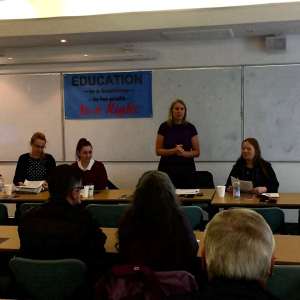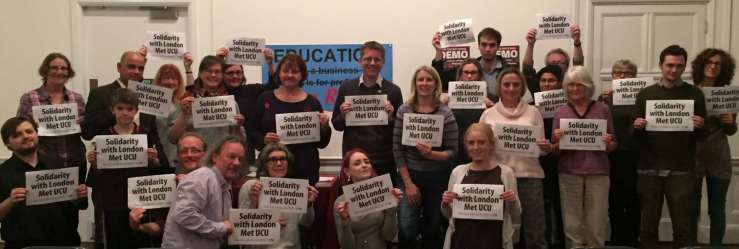At Lancaster University we held a series of three successful events over the course of a week (19-26 October 2016) to raise awareness of the Higher Education and Research Bill and the united opposition to it, culminating in the national demonstration #Nov19. We had a rally, a ‘teach-in’ and a ‘teach-out’ with UCU members, staff, the students’ union, students, the local NUT association and local MP taking part.
Campus lunchtime ‘Teach-In’
 Our ‘teach-in’ was a lunch-hour panel discussion with Cat Smith (Lancaster and Fleetwood MP) Liz Lawrence (UCU past president) and Rhiannon Llystyn Jones (Lancaster University Students Union). Each speaker gave a ten minute presentation and then we had over a dozen insightful questions from the audience. The meeting was reported in the campus alternative newsletter, Subtext, which drops into the email boxes of hundreds of staff. It noted that it was ‘still very rare’ to have an all-female panel and that the general consensus was that the Bill was a ‘solution looking for a problem.’
Our ‘teach-in’ was a lunch-hour panel discussion with Cat Smith (Lancaster and Fleetwood MP) Liz Lawrence (UCU past president) and Rhiannon Llystyn Jones (Lancaster University Students Union). Each speaker gave a ten minute presentation and then we had over a dozen insightful questions from the audience. The meeting was reported in the campus alternative newsletter, Subtext, which drops into the email boxes of hundreds of staff. It noted that it was ‘still very rare’ to have an all-female panel and that the general consensus was that the Bill was a ‘solution looking for a problem.’
Community evening ‘Teach-Out’
This was jointly hosted by Lancaster UCU and Lancaster, Morecambe and District NUT. Our speakers this time were Mark Campbell (victimised and sacked UCU chair at London Metropolitan University), Siobhan Collingwood (local NUT head-teacher) and Jenni Dybell (Lancaster University student). Our aim was to show how the HE Bill was part of a wider government push to commodify education from nursery to university, affecting everyone. The meeting heard powerful examples of how destructive this is on our young people, particularly from working class backgrounds, in terms of exclusion, mental health and poverty. It was good to have the opportunity to share our common concerns, making us all the more determined to fight the continuing marketization of learning.
Continue reading “The Higher Education and Research Bill Comes to Lancaster! – Julie Hearn”


 Our main hope of defeating the disastrous Higher Education and Research Bill lies in persuading sufficient numbers of Conservative MPs to vote against it. There may be resistance in the Lords, thanks to objections from some senior scientist peers – but the Lords are not accountable to any constituents, unlike MPs. And since everyone but the Conservatives voted against the Bill on its second reading, and since the Conservatives have resisted any amendments to the Bill in the committee stage, we can anticipate that only Conservative MPs will back it on its third and final reading. Given the government’s effective majority of 16, this means we must persuade a relatively small number of MPs to oppose the Bill.
Our main hope of defeating the disastrous Higher Education and Research Bill lies in persuading sufficient numbers of Conservative MPs to vote against it. There may be resistance in the Lords, thanks to objections from some senior scientist peers – but the Lords are not accountable to any constituents, unlike MPs. And since everyone but the Conservatives voted against the Bill on its second reading, and since the Conservatives have resisted any amendments to the Bill in the committee stage, we can anticipate that only Conservative MPs will back it on its third and final reading. Given the government’s effective majority of 16, this means we must persuade a relatively small number of MPs to oppose the Bill.